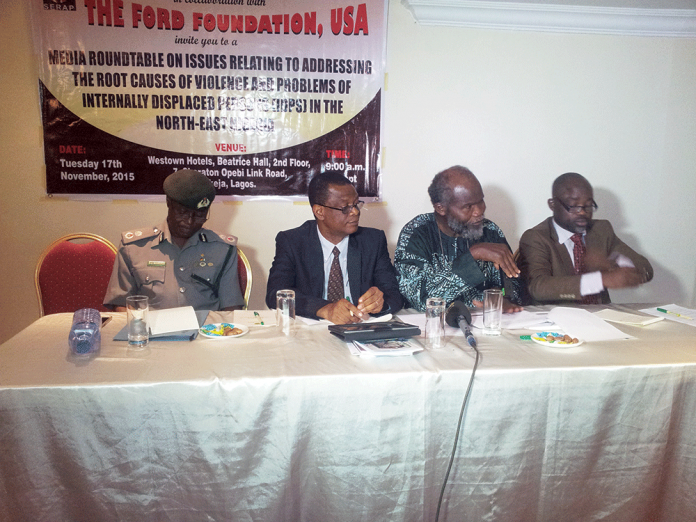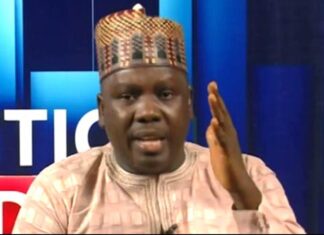Correspondent, ONYEWUCHI OJINNAKA, was at the recent roundtable on the roots of violence and the problems of IDPs by SERAP.
The plight of internally Displaced Persons (IDPs), especially from the North East geopolitical zone of Nigeria, has continued to draw the sympathy of civil society groups and activists.
One of the concerned persons is a retired Army General and activist, Ishola Williams.
“A new institutional arrangement is required at national and regional levels for making life better for IDPs, returnees, persons of concern and victims of terrorism,” Williams said, stressing that the bottom-line is to get them back to their villages of origin and work to rebuild their lives.
To address the problem of violence, which resulted in the displacement of people from their homes, Williams canvassed that President Muhammadu Buhari should “replace the Ministry of Women Affairs with a Ministry of Family Affairs, if the government is to effectively address the root of violence and IDPs in the North East of Nigeria”.
Williams was the Guest Speaker at a media roundtable on issues relating to the causes of violence and addressing the problems of IDPs in North East of Nigeria.
The conference, held on Tuesday, November 17, at Ikeja, Lagos, was organised by Socio-Economic Rights and Accountability Project (SERAP) in collaboration with the Ford Foundation, and was chaired by Honourable Justice Samuel Oseji of the Court of Appeal, Lagos Division.
According to the activists, “We must transform the hands that kill, maim and destroy into hands that can save and rebuild. We must do away with all the jargons in terms of peace-keeping, peace-making, peace-building, conflict transformation, and come up with innovative sustainable framework for crises/conflict prevention and mitigation at local and national level. For Nigeria, continuous political restructuring with emphasis on subsidiarity is absolutely important.
“We need to urgently redefine politics and power, and the linkage between the two with money. In addition, faith and action require two-pronged approach: counter-narratives in terms of beliefs, and guidance and role models in terms of action without politics.
“It is also important to emphasise family (e.g. Ministry of Family Affairs instead of Women Affairs) with emphasis equally on girl-child and boy-child. We cannot continue to ignore the key role of boys and young men in perpetrating conflict.”
In his opening remarks, chairman of the occasion, Justice Oseji, had advocated proper coordination of the victims of Boko Haram to enable them have access to medical treatment and other necessary support. He criticised “the financial recklessness of the country’s leaders” and urged the citizens and civil society organisations to ask questions on allocations of budgets and for what purposes the country’s resources and wealth are being spent.
A civil society group known as Justice for Victims of Boko Haram Campaign, at the conference, drew the attention of stakeholders to the rights of the victims of Boko Haram to reparations, justice and accountability, which have continued to be neglected, decrying that “the victims have largely remained in the background”.
The group called for public support to its activites and appealed passionately to President Buhari, Senate President, Bukola Saraki, and the Speaker of the House of Representatives, Yakubu Dogara, to work closely to initiate and develop a Comprehensive Legal and Policy Framework on Reparations for Victims of Boko Haram in the country. It posited that the framework should strive to combine individual and collective, symbolic and material forms of compensation for victims, and other means of reparations that are suited to restore victims’ dignity and humanity.
The proposed legal and policy framework, it added, should be adequately resourced by the authorities and through international assistance and cooperation, stressing that the process for developing the framework should not wait until peace is achieved in the North East.
The group demanded the President and leadership of the National Assembly to initiate and create a National Registry of Victims of Boko Haram as a way to facilitate their access to free legal aid, psychological and medical care, support, and reparations.
“We also call on President Buhari, Saraki and Dogara to urgently investigate the spending of the over N80 billion under the Victims Support Fund to ensure transparency and accountability as well as adequate support, assistance, and care for families and victims of Boko Haram across the country. The list of victims that have directly benefited from the fund should be published. The Victims Support Fund should ultimately be reformed and integrated into the proposed Legal and Policy Framework on Reparations for Victims of Boko Haram.
“We note that the vast majority of the victims are the economically and socially vulnerable, including women and girls, children, elderly and those that have been tortured, who continue to suffer stigma, social exclusion, and re-victimisation as a consequence of the lack of reparations, medical treatment and assistance to overcome the impact of the conflict between the government of Nigeria and Boko Haram.
“We also note that the International Criminal Court (ICC) has confirmed that between January 2012 and October 2013, 70 teachers and more than 100 school children and students were reportedly killed or wounded. In May 2014, Nigeria Union of Teachers (NUT) reported that at least 173 teachers had been killed between 2009 and 2014. Borno State officials have cited a slightly higher figure of 176 teachers. At least, 50 schools were either burnt down or badly damaged and 60 more were forced to close.”
The group is also concerned that victims are dying needlessly – deaths that are avoidable if urgent and continuous medical attentions are provided.
“We believe that a legal framework for reparations for victims of Boko Haram will serve as the beginning of a process of compensation and dignification for victims. We also believe that reparations have profound ethical and political implications and is an important component of the process of justice and accountability. Reparations for victims can also generate civic trust, re-establish the damaged relationship between citizens and the state, and ultimately help to consolidate the country’s democratic experience and the rule of law.
“For the purpose of the framework and the national register, victims should be defined to include persons who individually or collectively suffer harm, including physical or mental injury, emotional suffering, economic loss or substantial impairment of their fundamental rights, including the immediate family or dependents of the direct victims and persons who have suffered harm in intervening to assist victims in distress or to prevent victimisation,” it stated.













